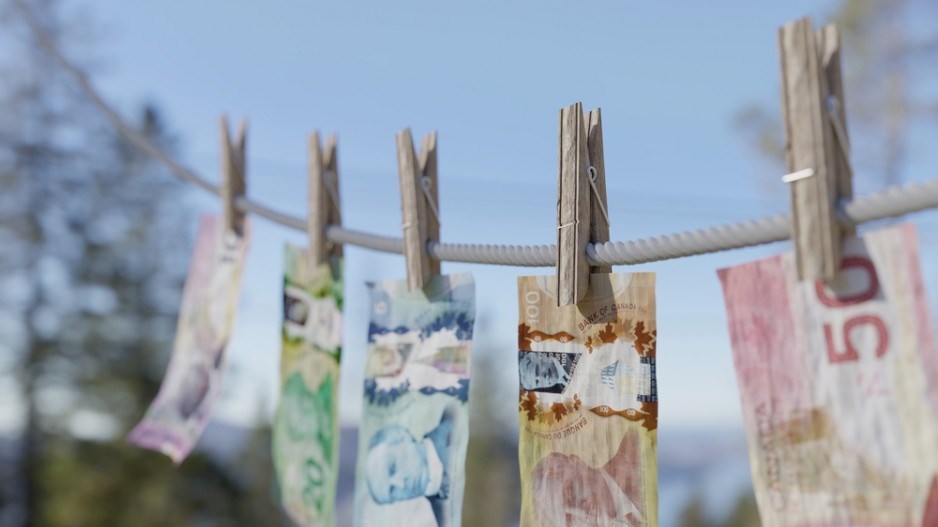B.C. Attorney General David Eby threw down the money-laundering gauntlet to electioneering federal politicians Sept. 23, asking for a commitment to continue to combat such crime from all parties.
Eby showed Union of B.C. Municipalities annual convention delegates Sept 23 a video of men carrying shopping bags full of cash into casinos, pushing bricks of bills through counting wickets.
He asked why no one thought of questioning how or why someone was bringing half a million dollars in cash to a casino.
“We cut off that practice in 2017,” Eby said, adding the government income took a hit from gaming revenues as a result.
He said changes in regulation have meant gaming regulation officials are now in casinos when people are actually gambling, rather than just 9-to-5.
He said cash continues to move into real estate, luxury cars and other laundering processes. And, he said, the issue is closely linked to the opioid crisis.
“It’s going into anything you can sell and conceal the origins of that cash. Once it’s into the system, how do you layer so many transactions onto that that it’s hard to trace?” Eby said.
And, both Eby and Finance Minister Carole James said, legislation and regulations are being changed to combat the issue. But both said, more needs to be done.
He compared it to playing ‘whack-a-mole.’ It’s hoped a coming provincial inquiry will shed further light, he said.
But, delegates heard, money launderers will use holes in regulation and government and law enforcement cooperation to continue to damage not only British Columbia but also Canada as billons of dollars change hands.
But, speakers said, it’s hard to identify criminals among legitimate businesspeople. And, they said, criminals seek countries such as Canada where high GDP rates mean large amounts of money in which laundered cash can be hidden.
The issue, said Simon Fraser University business Prof. Maureen Maloney, is ensuring governments, regulators and industry are sharing data across Canada.
Maloney authored the report Combating Money Laundering in B.C. Real Estate. Researchers found $46.7 billion was laundered through Canada’s economy in 2018.
Of that, Alberta had 10.2 billion, Ontario $8.2 billion and B.C. $6.3 billion.
And, that, James said, has added five percent in costs to the price of B.C. residences.
James said that translates to an average price boost of $32,000 for a condominium, $39,000 for a townhouse and $71,000 for a detached house.
The goal through legislation such as the Land Owner Transparency Act, the minister said is to shine a light into the dark corners of ownership to deter money laundering through the real estate sector.
“We are still coming to terms with how money laundering affects civil society,” she said.
She said a registry would be coming online in the spring to allow for such transparency.
Eby said luxury cars are being bought in the Lower Mainland, put in shipping containers and shipped overseas. He said it reached such a point that foreign Ferrari dealers wanted to know why Vancouver dealers were selling into their markets. And, that creates problems for local dealers, he said.
“They don’t want to be selling to straw buyers,” he said.
But, said Maloney, as the practice becomes more pervasive and controls are not put in place, there comes the chancer that real estate agent people, lawyers, accountant and others could be drawn into corrupt activity.
Indeed, she noted, an RCMP officer supervising an investigation into laundering of stolen Russian funds was recently arrested for allegedly stealing sensitive information.
Another key part of the puzzle, Maloney said, is tracking where criminal funds may have come from in the first place. Oftentimes, she said. When the source of funds is China with which Canada has not information exchange treaty, getting such information is difficult. She said it is easier when dealing with a cooperation state such as the U.S.
Manley said the idea of unexplained wealth orders might be an approach. Such tools mean an individual with an unidentifiable source of wealth must explain its provenance.
“I think they’re awesome,” Eby said. “I think they could be incredibly challenging. They are incredibly effective for high-profile cases for where police need to explain where money is coming from. They are incredibly invasive.”
“I am very much supportive of the idea that we could find some way to do that,” Eby said.
Another situation of concern was last year’s collapse of the prosecution of Silver International connected to an RCMP investigation alleging underground banking, money laundering and suspected drug cash used to fund Chinese gamblers in the province’s casinos.
B.C. Ministry of Finance Income Taxation Branch executive director Francis Camille said the government is working with the federal government on coordinating taxation issues.
He said taxation law couldn’te used to fish for criminal offenses but if criminal issues arise, they can be referred for investigation.
@jhainswo




